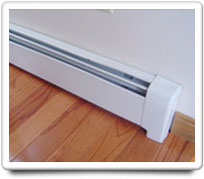Imagine this: it’s the end of a long day, and you’re ready to kick back and relax. But there’s a problem.
Your baseboard heater won’t turn off, and now your cozy retreat feels more like a sauna. You’re not alone. Many people face this frustrating issue, and it can leave you feeling helpless in your own home. But don’t worry, there’s hope.
We’ll explore the common causes behind this pesky problem and guide you through simple, effective solutions. Ready to regain control and restore comfort to your living space? Let’s dive in and tackle this together.

Credit: www.reddit.com
Common Causes
Baseboard heaters sometimes stay on due to faulty thermostats or wiring issues. These problems can lead to continuous heating, causing discomfort and higher energy bills. Regular maintenance helps prevent such issues.
When your baseboard heater refuses to turn off, it can feel like your home is locked in a perpetual sauna. Understanding the common causes of this issue is the first step to regaining control over your indoor climate. Let’s dive into some typical culprits that might be keeping your heater on overdrive.Thermostat Issues
A malfunctioning thermostat is often the primary suspect when your baseboard heater won’t shut down. Perhaps the temperature setting is incorrect or the thermostat itself has developed a fault. Check if the thermostat is properly calibrated. Sometimes, dust and debris can interfere with its sensors, causing it to misread the room temperature. Replacing an outdated thermostat with a programmable one can offer better control and efficiency. Have you ever considered how a small device can dictate your comfort?Wiring Problems
Faulty wiring can also be a reason why your heater continues to operate non-stop. This could be due to loose or damaged wires that create a constant power supply to the heater. Conduct a visual inspection of the wiring for any obvious signs of wear or damage. However, dealing with electrical issues can be risky, so it’s wise to consult a professional. Have you ever thought about the potential fire hazards associated with bad wiring? Ensuring your home’s electrical system is in good shape is crucial for your safety.Faulty Heater Components
Sometimes, the problem lies within the heater itself. Components like the relay switch or the heating element might be defective, causing the heater to remain on. Listen for unusual noises or check for any unusual smells that might indicate a component is failing. Such signs should prompt you to seek a technician’s help. Is your heater still under warranty? If so, this might be the perfect opportunity to address component issues without additional costs. By understanding these common causes, you can take practical steps to address the issue and restore your home’s comfort. Don’t let a stubborn heater dictate your living conditions. Consider tackling these problems before they escalate.
Credit: home-wizard.com
Troubleshooting Steps
Baseboard heaters are a great way to keep your home warm during chilly months. But what happens when your baseboard heater won’t turn off? This can be both frustrating and costly. Thankfully, by following some troubleshooting steps, you can identify the issue and potentially solve it yourself. Let’s dive into the process of getting your heater back to its normal operation.
Check The Thermostat
Start with the thermostat. Is it set correctly? Sometimes, a simple adjustment is all you need. Ensure it’s not set to a higher temperature than intended. If the thermostat seems faulty, consider replacing it. A friend once had their thermostat stuck on ‘heat’, causing continuous heating. A quick swap fixed their issue.
Inspect Wiring Connections
Next, examine the wiring connections. Faulty wiring can lead to a heater that won’t turn off. Inspect the wires for any signs of damage or loose connections. You might find that a loose wire is causing the heater to stay on. Always turn off the power before checking, to keep yourself safe.
Examine Heater Parts
Finally, take a look at the heater parts. Check for any visible damage or wear and tear. Sometimes, a malfunctioning part can be the culprit. Did you know a friend of mine discovered a damaged relay was causing their heater to misbehave? Replacing it solved the problem instantly.
By following these steps, you may be able to fix the issue yourself. If not, it might be time to call in a professional. Have you ever fixed a heater issue on your own? What worked for you? Share your experience in the comments!
Repair Solutions
When a baseboard heater refuses to turn off, it can lead to discomfort and increased energy bills. Repair solutions can help restore your heating system to its optimal state. Whether it’s a faulty thermostat, wiring issues, or broken components, understanding the root of the problem is key to fixing it.
Replacing The Thermostat
A malfunctioning thermostat can cause your baseboard heater to stay on indefinitely. Check if the thermostat is outdated or damaged. If you have an old dial-type thermostat, consider upgrading to a digital model for better precision.
Sometimes, a simple calibration or reset might solve the issue. But if the thermostat is beyond repair, replacing it is a straightforward task. Make sure to disconnect the power first to avoid any electrical hazards.
Imagine waking up in the middle of the night, sweating under the covers. A new thermostat could save you from those uncomfortable nights, while also cutting down on unnecessary energy use.
Fixing Wiring Faults
Faulty wiring can keep your heater running endlessly. Inspect the wiring connected to the thermostat and the heater. Look for frayed wires or loose connections that might be causing the problem.
If you’re handy with tools, you could attempt to fix minor wiring issues yourself. However, if you’re unsure, calling a professional electrician might be your best bet to avoid further damage or safety risks.
Have you ever tried to fix a simple electrical issue, only to find it was more complex than you thought? Sometimes, getting expert help is the fastest solution, and it ensures your heater functions safely and efficiently.
Repairing Or Replacing Components
Components like the heater’s control valve can fail, leading to continuous operation. Inspect the heater’s internal parts to identify any damaged or worn-out components. A quick replacement might be all that’s needed to solve the issue.
When parts like the control valve or heating element are broken, they can be replaced individually. This targeted approach is often cost-effective compared to replacing the entire unit.
Think about the last time you had to replace a small part in your car. It was a quick fix that saved you from a larger expense. The same principle applies here—sometimes small repairs can make a big difference.
What would you do if you found your baseboard heater running non-stop? These repair solutions might just be the fix you need to restore comfort and efficiency in your home. Have you tried any of these methods before? Share your experiences and insights in the comments below!
Preventive Measures
Baseboard heaters staying on can lead to overheating. Regularly check the thermostat for faults. Ensure no obstructions block airflow around the heater.
Preventive measures can save you from the headache of a baseboard heater that refuses to turn off. Regular upkeep and inspections are key to ensuring your heating system runs smoothly. Here’s how you can keep your home warm and your stress levels low.Regular Maintenance
A consistent maintenance routine can keep your heater in check. Dust and debris often collect in and around baseboard heaters. Clean them regularly to ensure proper airflow. Consider creating a monthly checklist. This could include tasks like vacuuming the heater and checking for any visible damage. Keeping a simple schedule can prevent small issues from becoming bigger problems.Professional Inspections
Don’t wait for a problem to appear before calling a professional. Schedule yearly inspections to catch any potential issues early. A trained eye can spot things you might overlook. Think of it as a health check-up for your heater. During an inspection, a professional can tighten loose connections and ensure your thermostat is functioning correctly. Wouldn’t you rather catch a problem early than face a costly repair later?Upgrading Equipment
Old heaters may not perform efficiently. Consider upgrading to a more modern, energy-efficient model. Newer models often come with better safety features and improved thermostats. Investing in updated equipment can also lead to savings on your energy bill. If you’re unsure about the right model to choose, consult with a professional. They can recommend equipment that suits your home’s needs and keeps your heating system running efficiently. Taking these preventive measures can provide peace of mind. You can enjoy a warm home without the worry of your heater running nonstop. Are you ready to take action and prevent future heating headaches?When To Call A Professional
Persistent issues with baseboard heaters often require expert attention. A professional can diagnose wiring or thermostat problems causing the heater to stay on. Prompt intervention ensures safety and efficiency.
When your baseboard heater won’t turn off, it can be frustrating and concerning. Sometimes, simple troubleshooting like adjusting the thermostat or checking for blockages can solve the problem. But, when these efforts fall short, it might be time to call in the experts. Knowing when to seek professional help can save you time, money, and peace of mind.Complex Electrical Issues
If your baseboard heater is refusing to turn off due to complex electrical issues, it’s a sign to call a professional. Messing with electrical wires without proper knowledge can be dangerous and may even worsen the situation. A licensed electrician can diagnose and fix these problems safely and efficiently.Persistent Problems
Have you tried everything, yet your heater still acts up? If the problem keeps coming back, it’s more than just a small glitch. A professional can identify underlying issues that might be causing the persistence, ensuring a long-term solution rather than a temporary fix.Safety Concerns
Are there strange smells or sounds coming from your heater? This could indicate a safety hazard like overheating or a short circuit. Ignoring these signs can be dangerous. A professional can assess the risk and prevent potential accidents, keeping your home safe. Reaching out to a professional might feel like a big step, but it can be essential for complex, persistent, or safety-related issues. Have you ever tried fixing something and ended up with a bigger problem? Sometimes, it’s best to let the experts handle it.
Credit: www.reddit.com
Frequently Asked Questions
Why Won’t My Baseboard Heater Turn Off?
A faulty thermostat or a stuck relay switch could be the issue. Check these components first.
How Can I Manually Shut Off A Baseboard Heater?
Turn off the circuit breaker connected to the heater. This stops the power supply instantly.
Is It Safe To Leave A Baseboard Heater On?
No, it’s not safe. Continuous operation may cause overheating and increase energy bills.
What Causes A Baseboard Heater To Malfunction?
Wiring issues, thermostat failures, or mechanical problems often cause malfunctions. Regular maintenance can help prevent this.
Can A Thermostat Replacement Fix My Heater Issue?
Yes, replacing a faulty thermostat often resolves heater problems. Ensure compatibility with your specific heater model.
Conclusion
Fixing a baseboard heater that won’t turn off can be simple. Check the thermostat settings first. Ensure they are correct and working. Inspect the heater for stuck switches. Regular maintenance helps prevent future issues. Clean and check parts regularly. If problems persist, professional help might be needed.
Safety is important. Remember to turn off power before repairs. Enjoy warm, cozy rooms with a properly functioning heater. Troubleshooting saves time and money. Keep your home comfortable all winter. Understanding your heater is key. Happy heating and stay safe!





